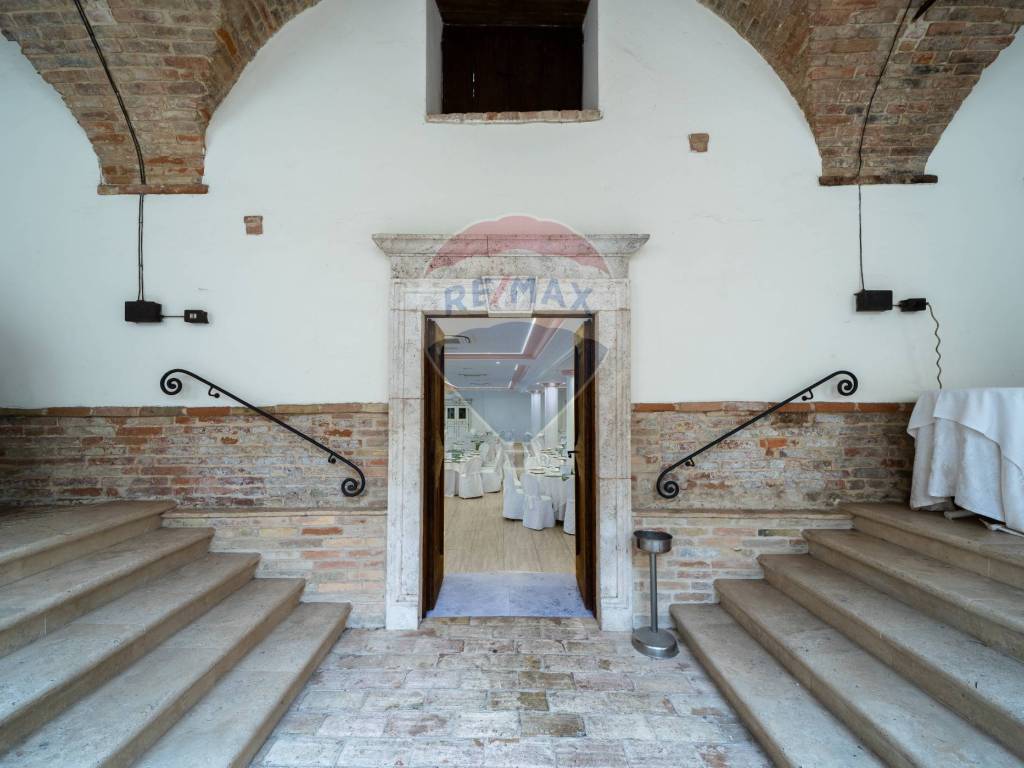1/47


Note
Listing updated on 11/05/2024
Description
This description has been translated automatically by Google Translate and may not be accurate
reference: 37741027-11
CHARMING RELAIS “PALAZZO DUCALE DELLA MONTAGNOLA”: STAYING IN HISTORY
Re/Max Fides offers for sale a splendid tourist accommodation facility located in Corropoli (TE), perfect for banquets, events and tourism in the heart of the countryside on the border between Abruzzo and Marche and 8 km from the silky beaches of Alba Adriatica and Tortoreto. This noble country palace, surrounded by a large garden, is the perfect setting for elegant wedding receptions or other festive occasions, ideal for quality tourist stays in an atmosphere full of history and very country chic, or as a prestigious venue for higher education schools or cultural institutions. Currently the structure is made up of several banquet rooms, a bar room, two large professional kitchens, nine well-kept rooms, full of atmosphere and furnished with period pieces, all with private bathrooms, some of which have disabled access, and from which you can access it enjoys magnificent views of the countryside. Other evocative rooms cheer up the visitor, such as the barrel cellar with the old tanks for winemaking, the room of the old oil mill or the rich series of objects from rural civilization, almost a museum available to testify to the typical nature of the places, all surrounded by a large garden, with the possibility of building a swimming pool, and completed by a car park for guests of the structure. The structure is located in Corropoli in the province of Teramo, and can be reached by car from the SP 259 towards Corropoli – Nereto. The property is also easily connected to the airports of Pescara, Ancona and Rome. Built as a country casino, used for hunting and recreation, it was built in the first half of the 15th century at the behest of Andrea Matteo II d'Acquaviva, scion of a noble lineage related to the Sforza and Visconti families. In 1688 the building was donated by the Duchess of Atri to the Franciscan friars, who transformed it into a convent, given the presence of the adjacent church of Santa Maria degli Angeli, which forms a single monumental complex with the Palace. In 1871, after the suppression of the religious orders, the Palace became home to a silkworm breeding establishment. After being subsequently transformed into a farmhouse, in 1999 a local agricultural entrepreneur purchased this valuable structure. With great wisdom and respect and in concert with the local Superintendence, the Palace has been restored to its former glory, revealing its fascinating character full of history.
Re/Max Fides offers for sale a splendid tourist accommodation facility located in Corropoli (TE), perfect for banquets, events and tourism in the heart of the countryside on the border between Abruzzo and Marche and 8 km from the silky beaches of Alba Adriatica and Tortoreto. This noble country palace, surrounded by a large garden, is the perfect setting for elegant wedding receptions or other festive occasions, ideal for quality tourist stays in an atmosphere full of history and very country chic, or as a prestigious venue for higher education schools or cultural institutions. Currently the structure is made up of several banquet rooms, a bar room, two large professional kitchens, nine well-kept rooms, full of atmosphere and furnished with period pieces, all with private bathrooms, some of which have disabled access, and from which you can access it enjoys magnificent views of the countryside. Other evocative rooms cheer up the visitor, such as the barrel cellar with the old tanks for winemaking, the room of the old oil mill or the rich series of objects from rural civilization, almost a museum available to testify to the typical nature of the places, all surrounded by a large garden, with the possibility of building a swimming pool, and completed by a car park for guests of the structure. The structure is located in Corropoli in the province of Teramo, and can be reached by car from the SP 259 towards Corropoli – Nereto. The property is also easily connected to the airports of Pescara, Ancona and Rome. Built as a country casino, used for hunting and recreation, it was built in the first half of the 15th century at the behest of Andrea Matteo II d'Acquaviva, scion of a noble lineage related to the Sforza and Visconti families. In 1688 the building was donated by the Duchess of Atri to the Franciscan friars, who transformed it into a convent, given the presence of the adjacent church of Santa Maria degli Angeli, which forms a single monumental complex with the Palace. In 1871, after the suppression of the religious orders, the Palace became home to a silkworm breeding establishment. After being subsequently transformed into a farmhouse, in 1999 a local agricultural entrepreneur purchased this valuable structure. With great wisdom and respect and in concert with the local Superintendence, the Palace has been restored to its former glory, revealing its fascinating character full of history.
Features
- Contract
- Sale
- Type
- Building | Medium property class
- Surface
- 7,968 m²
- Rooms
- 5+ rooms, 3+ bathrooms
- Floor
- Ground floor, with disabled access
- Total building floors
- 2 floors
- Car parking
- 20 in shared parking
- Availability
- Available
- Current building use
- Commercial
Other features
- Reception
- Window frames in glass / wood
Surface detail
Inn or hotel
- Floor
- Ground floor
- Surface
- 7,968.0 m²
- Coefficient
- 100%
- Surface type
- Main
- Commercial area
- 7,968.0 m²
Price information
- Price
- € 2,950,000
- Price per m²
- 370 €/m²
Energy efficiency
Condition
Excellent / RefurbishedHeating
Central, floor heating, powered by methaneAir conditioner
Independent, cold/hotEnergy certification
Not classifiable
Floorplan
Additional options

















































